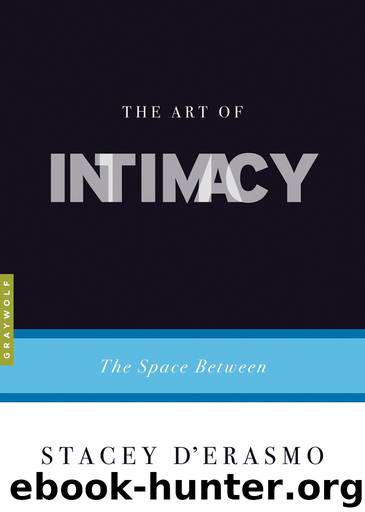The Art of Intimacy by Stacey D'Erasmo

Author:Stacey D'Erasmo
Language: eng
Format: epub
ISBN: 978-1-55597-075-8
Publisher: Graywolf Press
It isn’t until midway through the story that the first-person narrator reveals himself and reveals that he’s been narrating all along. He slips into a scene that at first doesn’t seem to include him, a moment of Mark leaning against a wall, “his black curly hair closely shorn.” The narrator remarks, “Last year it was long. He still seemed angelic. . . . I felt like I was on something, but had a hard-on; the best of both worlds.” Blurring perspective, time, and even his own consciousness, the narrator unmasks himself in the equivalent of a mumbled aside, making himself a shadow to his ex-lover; or, as he puts it, “a ghoul . . . dreaming of someone I barely know.” If Conrad used blur and penumbra to charm and disorient the reader while dispatching the disturbing other into the sea, and Larsen blurred perspective at the root so that one woman could take ownership of the story of the disturbing other, Cooper uses shadow, blur, and a nearly entirely effaced narrator to slip up behind this Mark, this mark on the page, and describe him to death.
As we come to understand that we are reading a spurned lover’s version of another man’s life, specifically the other man’s sex life, the reason for the malice, the invocation of Mark as skeleton, in these descriptions seems to become clear. “A man,” observes the narrator, “has his face in Mark’s ass. It smells like a typical one, but belongs to a boy who’s a knock-out, so it’s symbolic. . . . It’s the end of their day, the beginning of mine. He’d just be spreading his ass with his hands and fitting it over my face about now, if he were smart and didn’t need money, settled for gold in the eyes of a guy who is gaga for him.”
In other words, in the ex-lover’s gaze, Mark is a stupid whore, an It, a skeleton, an “apparatus” mainly identifiable by the ordinary smell of his ordinary ass. “I exaggerated his power, as it was a time in my life when I needed to feel very strongly,” opines the narrator. “Mark filled the bill.” This spiteful take on Mark would not be interesting, though, if Cooper didn’t also allow us to see the deeper motive for this rage, that it is revenge for an injury he feels that Mark inflicted on him, but not the injury of leaving. Yes, Mark did pass as quickly through the narrator’s life as he had through the lives of other men, but the injury he inflicted on the narrator was inflicted when they were together.
The narrator writes, “When I was with him his looks left me speechless, and that kind of beauty is insular, fills all my words anyway, so that what I construct must divide him from them in slight ways, such as the warmth of his skin against clinical language, like that of a man who lies down on a sharp bed of nails and is saved from real pain by the evenness of the impression.
Download
This site does not store any files on its server. We only index and link to content provided by other sites. Please contact the content providers to delete copyright contents if any and email us, we'll remove relevant links or contents immediately.
| Authorship | Bibliographies & Indexes |
| Book Industry |
Asking the Right Questions: A Guide to Critical Thinking by M. Neil Browne & Stuart M. Keeley(5752)
Autoboyography by Christina Lauren(5226)
Eat That Frog! by Brian Tracy(4518)
Dialogue by Robert McKee(4385)
Sticky Fingers by Joe Hagan(4188)
Journeys Out of the Body by Robert Monroe(3615)
Annapurna by Maurice Herzog(3464)
Full Circle by Michael Palin(3443)
Schaum's Quick Guide to Writing Great Short Stories by Margaret Lucke(3369)
Elements of Style 2017 by Richard De A'Morelli(3338)
The Art of Dramatic Writing: Its Basis in the Creative Interpretation of Human Motives by Egri Lajos(3058)
Atlas Obscura by Joshua Foer(2950)
Why I Write by George Orwell(2944)
The Diviners by Libba Bray(2927)
The Fight by Norman Mailer(2924)
In Patagonia by Bruce Chatwin(2919)
The Mental Game of Writing: How to Overcome Obstacles, Stay Creative and Productive, and Free Your Mind for Success by James Scott Bell(2897)
Venice by Jan Morris(2568)
The Elements of Style by William Strunk and E. B. White(2469)
